CBD for Weightlifting: What Does It Really Do? (If Anything)
Author:
Unlock your full potential by engaging with our experts and community! Have questions about your fitness journey or looking for expert advice on weightlifting techniques? Don’t hesitate — leave a comment below and Jacek Szymanowski will provide a personalized answer and insights to help you reach your goals.
Torokhtiy is reader-supported. Some links are affiliate links, and we may earn a commission at no extra cost to you. See our disclosure page for details.
Cannabidiol, or as it’s more commonly known CBD is starting to get accepted in today’s society more and more. And naturally, it made its way among athletes and into weightlifting.
So, today on the agenda we have the question of whether using CBD when you’re a weightlifter is necessarily a good thing, is it a bad thing, or even – does it do anything at all in that department or is it ‘snake oil’?
Well, to keep it short, the answer is an unexciting – “Maybe.” (well, perhaps you find ‘maybe’ exciting, in which case it is exciting after all)
In order to further clarify what we specifically mean by saying ‘maybe’ let us jump right into this topic and find out why the answer is so uncertain.
Let’s go!
What is CBD for Weightlifting? – CBD or cannabidiol is used in weightlifting to possibly help manage pain, reduce inflammation, and help improve recovery times. CBD also helps the user with better sleep and reduces stress which can help with athletic performance.
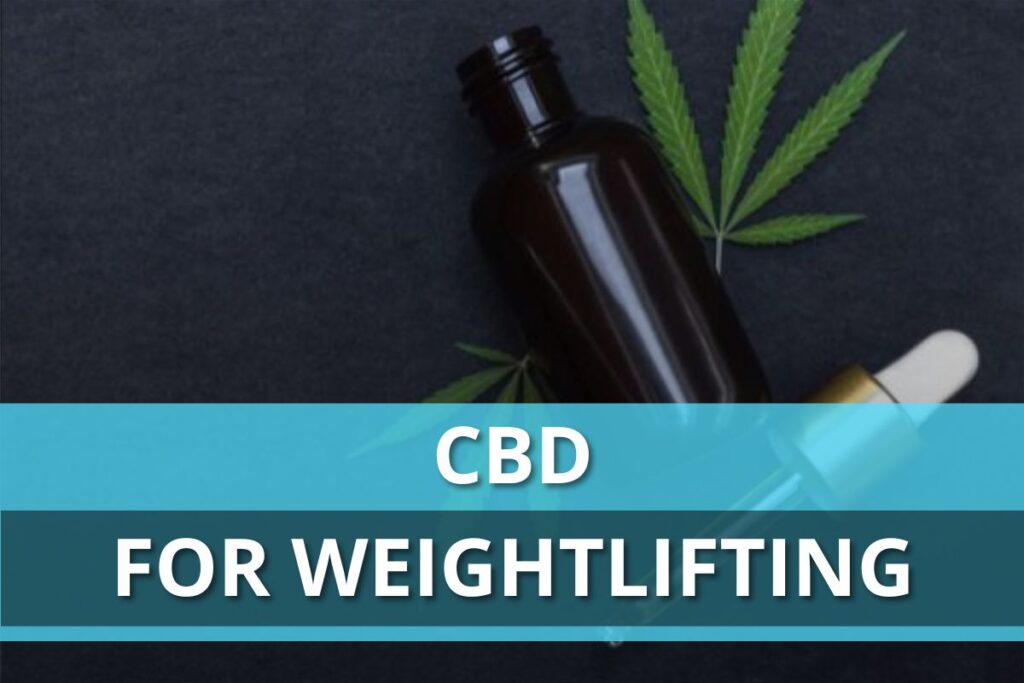
CBD and Training – All You Should Know
CBD has been around for a significant amount of time but has just fairly recently become legal and therefore more popular with the mainstream public. The 2014 US Farm Bill jump-started it all by allowing state-regulated legal cultivation of hemp. Since CBD is derived from hemp, this bill propelled CBD production and research.
In 2018, the US Farm Bill further defined and legalized hemp that had less than 0.3% THC (tetrahydrocannabinol) in it. This allowed for the production of CBD without legal repercussions.
As CBD became more and more popular and its benefits started coming to light and became more recognized, it was only natural for it to find its way into sports (including weightlifting) at one point or another.
What is CBD?
CBD is a compound found in cannabis plants. After reading that sentence, you might be thinking of getting “high”, but CBD is not psychoactive. The psychoactive component is actually THC (tetrahydrocannabinol) but having that in legal products is a big no-no. In fact, for the product to be legally classified as CBD, it has to contain less than 0.3% THC, otherwise, it is not a legal product.
Now, some products are mislabeled, and they might contain higher levels of THC, but that could get you in trouble because, technically, it’s illegal. That’s why you want to make sure you’re getting CBD from a reputable seller.
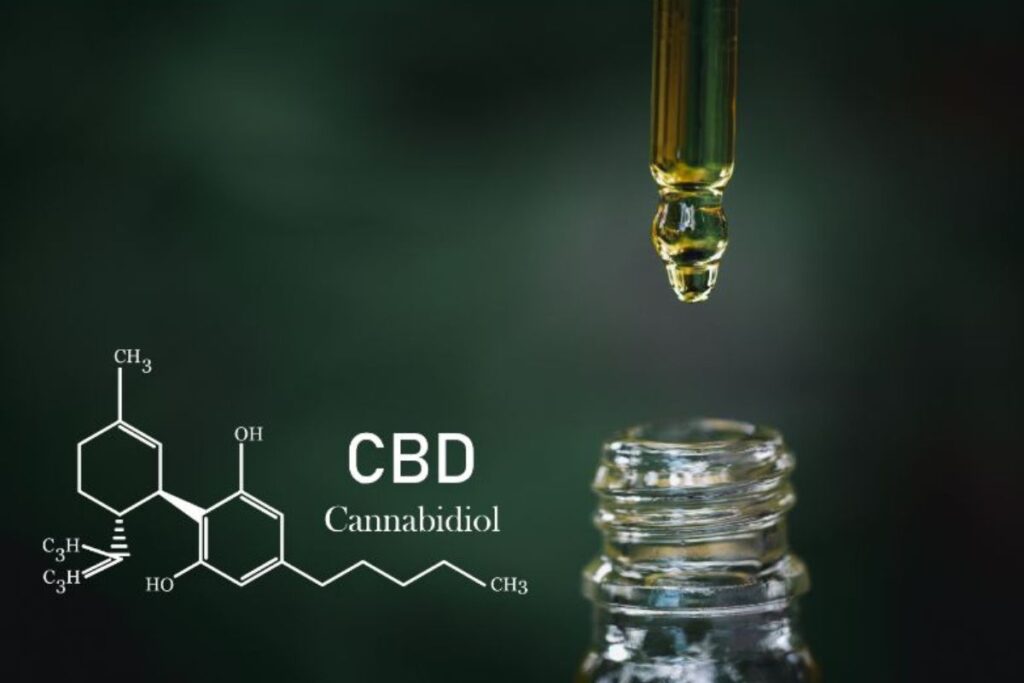
So, why is CBD so popular? It’s believed to have health benefits, like pain relief, reducing anxiety, and improving sleep. For weightlifters in particular, it might help with recovery, reduce inflammation, and give you a sense of calm that can improve focus. The key word here is might, though, so keep that in mind.
Endocannabinoid System
The endocannabinoid system (ECS) is a complex cell-signalling system that plays a role in various psychological processes, like mood, pain sensation, appetite, and immune function. It consists of 3 main components: endocannabinoids, receptors, and enzymes.
Endocannabinoids are naturally occurring compounds in the body similar to cannabinoids found in cannabis. They interact with CB1 receptors in the brain and nervous system, and CB2 receptors in the immune system and organs. Enzymes like FAAH and MAGL break down endocannabinoids after they’ve done their job.
When you take CBD, it interacts with the ECS by influencing these receptors and enzymes (directly and indirectly). This can help control pain, reduce inflammation, and improve mood.

5 Potential Benefits of CBD for Weightlifters
As far as benefits of CBD for athletes go, there seems to be a good amount of them for weightlifters. The research is still in the early stages, though, but here are some potential advantages based on what we know so far.
✅ Anti-Inflammatory Properties
You want that inflammatory response your body gets from working out because, after all, that’s what helps build muscle. So not having an inflammatory response (for example, when consuming ibuprofen or something similar) is often straight-up bad, as it will prevent muscle growth. But having a too severe inflammatory response is also equally bad.
To keep it simple: Balance is the key – acute inflammation is crucial for the recovery process, chronic – is bad.
If you’d want to tone the inflammation down a notch ,it seems like CBD can help you in that department. It won’t have the effect of, say, Ibuprofen (as stated above) because that’s a much more potent substance, but CBD can balance the inflammation and reduce some of the discomfort that usually accompanies this response.
✅ Neuroprotective Effects
CBD shows some promise in protecting the nervous system. For weightlifters, this can mean better protection against nerve damage that might result from intense workouts and heavy lifting.
✅ Pain Relief
This is one of the most talked-about potential benefits and there’s some evidence to support it. If you’re a lifter, you’re more than familiar with joint and muscle pain, and CBD could be a natural alternative to traditional painkillers.
✅ Anxiety Reduction
Those that compete know all about the stress and anxiety that can bring about as an unwelcome bonus. CBD might help you out there and promote a calmer state of mind that could help you focus better.
✅ Recovery
CBD could be great for recovery because it can promote better sleep and relaxation. Your muscles need that rest to recover and repair, so if your sleep quality is better, your muscles will be happier. In the end, this could make your recovery period more effective.
✅ Scientific Evidence and Studies
The best word to describe the results of scientific evidence as a whole is – inconclusive. This is all very new and in all honesty, the research on CBD and athletic performance isn’t currently there yet.
The research that does exist, like the 2023 one from Molecules, shows that CBD interacts with pro-inflammatory enzymes and has a role in producing substances that help resolve inflammation.
Another study published in the Journal of Cannabis Research from 2022 hints at CBD’s ability to interact with the body’s endocannabinoid system, potentially protecting brain cells from damage and reducing neuroinflammation.
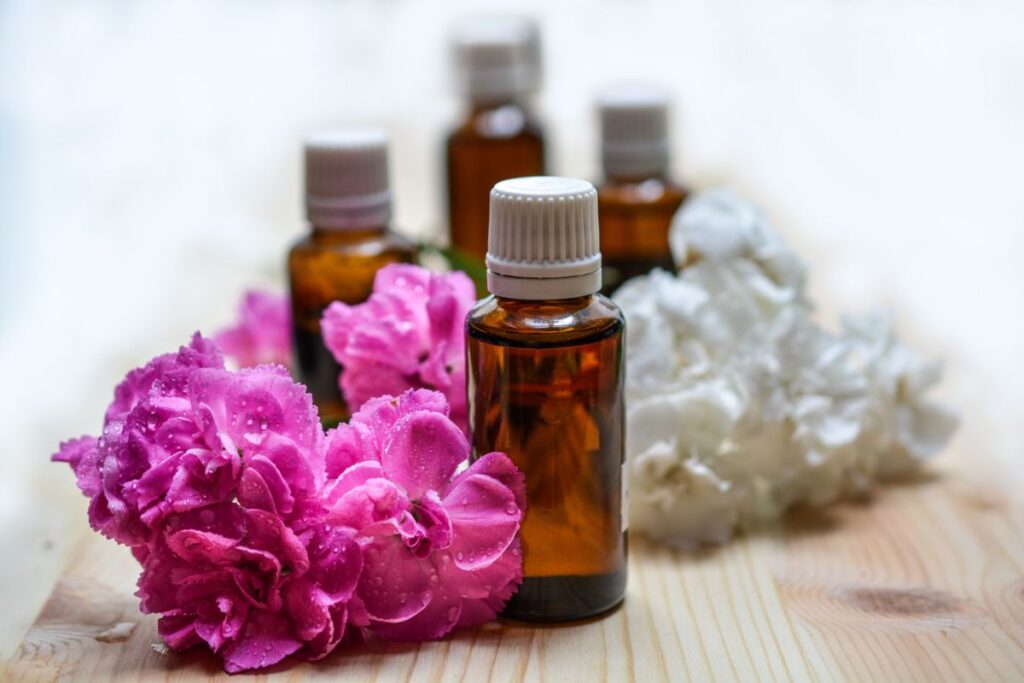
Generally, when it comes to specifically athletic benefits, the studies show slight effects, not effects, sometimes the effects could be attributed to the placebo effect, and in certain cases where the effects were noticeable and significant, the conditions might be the primary reasoning.
Overall, we need more research – the general kind, but especially the kind that can let us know what CBD could do for lifters and athletes in particular.
4 Potential Side Effects of CBD
Usually, people tolerate CBD quite well, but everything has side-effects, including CBD. Our physiology doesn’t have quick fixes – it works through complex feedback mechanisms where one action often triggers a counteraction.
We can’t really speak about long-term effects yet, especially when it comes to CBD and working out, because there’s simply not enough research and information on that, but there are some short-term side-effects we’re aware of.
❌ Dry Mouth
Dry mouth is one of the side-effects a lot of people seem to struggle with. This happens because cannabinoids can affect the salivary glands and reduce the production of saliva.
❌ Drowsiness and Fatigue
If you take a higher dose, you can expect some drowsiness and fatigue. This isn’t bad if you’re aiming to improve sleep quality, but it can be a problem if taking a nap isn’t in your plans.
❌ Changes in Weight and Appetite
CBD can help with nausea, and it can increase appetite in some cases, but it’s also been reported that it can decrease it, so you might notice your weight changing if you’re taking CBD.
❌ Diarrhea
Apart from drowsiness and fatigue, higher doses can also cause diarrhea and other gastrointestinal issues. This side-effect is usually linked to the use of CBD oil, so there’s a chance it’s related more to the oil and less to the CBD itself but too soon to tell yet.
These are common side affect that aside from research are also often results of anecdotal evidence and reports.
Tips From the Champ
My personal concern that need to be verified and researched properly is CBD influence on male reproductive system as it’s shown that ECS is involved as a modulator in multiple stages of HPG axis – therefore regulating sex hormones, and by regulating I mean possibly inhibiting sex hormones secretion, in multiple ways.
For that reason I personally recommend anyone who considers including CBD for its benefits to do bloodwork before and after a couple of weeks of intake, to make sure benefits are not outweighed by the possible side effects. As we know there are many ways to skin a cat.
Olympic Weightlifting Champion
Legal Considerations and Drug Testing
With CBD and its close relation to cannabis, it’s no wonder people think of legal implications when they consider using it.
The good news? The World Anti-Doping Agency (WADA) has removed CBD from its list of prohibited substances, so athletes can use it freely. The bad news?
CBD can sometimes contain trace amounts of THC, the psychoactive component of cannabis, which is strictly prohibited. Now, if you’re thinking you can just get any CBD product that’s labelled as THC-free and be fine, you couldn’t be more wrong.
Even products that are labelled and marketed as being completely free of THC can still contain it because CBD can get contaminated during the manufacturing process.
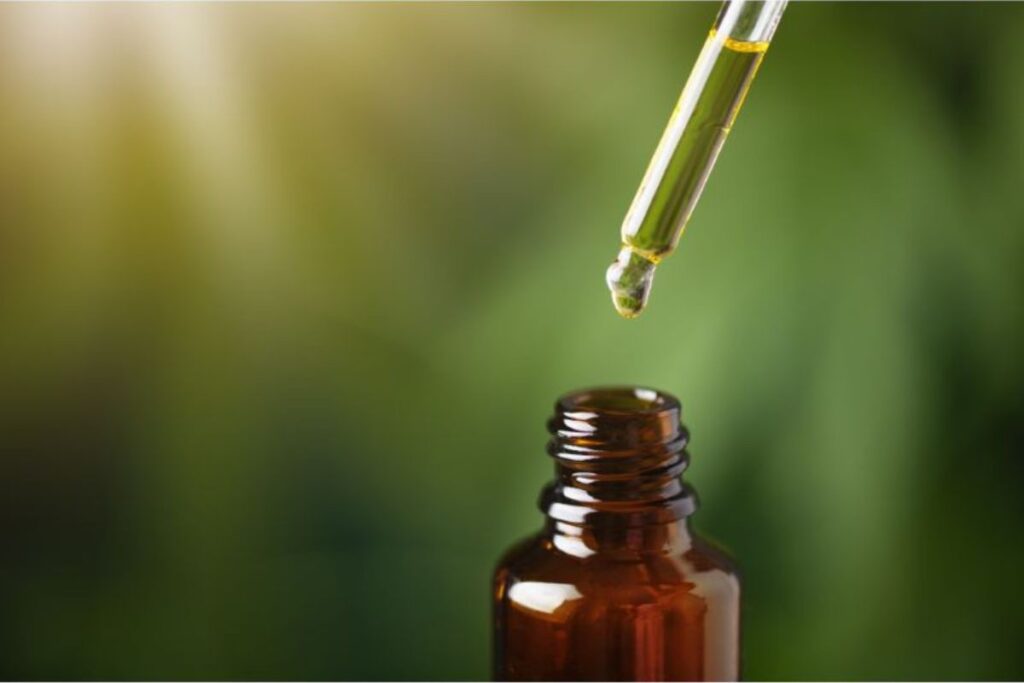
And if you happen to consume a contaminated product, you could test positive in a drug test for THC even weeks after you’ve taken it.
It’s important to note that even small amounts of THC can be detected, which will lead to sanctions and disqualification. WADA sets the urinary threshold for THC at 150 nanograms per milliliter, which is very low. This means that even a whiff of THC will be detected.
Generally, anything that has 0,3% of THC or less is safe (in the eyes of the law) to use. However, you still need to do your research and verify regulations to make sure you’re compliant.
Two things to note and consider when it comes to the legality of CBD are:
1. Where Do You Live?
The legality of CDB is determined by the laws and regulations of the country you live in, and each country has its own set of laws/regulations. So if you are not living in the US, we’d advise you to check the legality status of CBD to avoid potential issues.
2. How Much THC the Product Actually Has?
Even though the manufacturer claims that the product has the legal amount of THC in it: less than 0.3%, 0%, or whatever the legal amount in the country you live in is (check the point above).
The thing is, CBD products can be contaminated with higher doses of THC than what the label says and it can be enough to result in unwanted side-effects, like intoxication or impairment. It could even prevent you from competing because you might get banned.
This could be detrimental to a professional who is about to undergo doping testing, or in any similar situation. Precautions are advised.
How to use CBD for Weightlifting?
After you’ve made absolutely sure you’ve got the good, uncontaminated stuff, you need to know how to use it and integrate it into your regimen.
Here’s some info on that:
1. Forms
Oils and tinctures are super popular because they’re easy to use and absorb quickly when you place it under the tongue. They come in various strengths.
Creams, balms, or salves are some other forms CBD comes in and they’re applied directly to the skin, over sore muscles or joints.
You can also find pre-measured doses that come in capsule forms that you take like any other pill.
You might find some that are supposed to be inhaled, but we really don’t recommend taking any of those.
2. Dosage
Currently, the correct dosage has not yet been confirmed by any studies, as effects vary from potent to non-existent on various subjects.
So, the best thing is to start by consulting the product package that you’re using. If unsure, start with a low dosage, like 10-20 mg, and increase it slowly until you find the amount that works for you. If your weight is higher, you might need a slightly higher dose, but this varies from person to person because everyone responds differently.

If you’re new to CBD or you have some health issues, it’s best to have a word with a doctor that has experience with CBD.
3. Timing
If you’re taking CBD before a workout, take it about 30 minutes before you start. That shouldn’t make you drowsy and it can help with anxiety. If you’re taking it to help with soreness after a workout, take it within 30 minutes to an hour after you’re done.
Overall, you can use it for several days or weeks consistently because it may take your body some time to respond fully.
CBDistillery 1000mg Full Spectrum CBD Oil Tincture
Unless you want to spend hours upon hours researching and trying to find a CBG product that’s safe and won’t cause problems with THC contamination, we have a great one to recommend.
CBDistillery’s Full Spectrum CBD oil tincture gives you a potent dose of CBD – 33 mg per serving. It’s formulated from non-GMO industrial hemp and uses CO2 extraction for high purity and consistency. There’s also an addition of fractionated coconut oil (MTC) for bioavailability, which means the CBD oil is more effective because of this addition.
It’s third-party tested and guarantees safety and quality. CBDistillery’s tincture has less than 0,3% THC so the psychoactive effects are minimal, but you still get the benefits of CBD.
Positives:
Could be better:
Conclusion
So what did we learn from all of this? Well, we learned that we actually do not know (conclusively) all that much about the effects of CBD on weightlifting. If you’re more confused than you were when you started reading this, it’s understandable because there’s a lot of maybes, mights, and possibilities.
While scientific evidence on CBS’s effectiveness in weightlifting isn’t yet concrete, the outlook remains positive as further research on the potential benefits for the user is just around the corner.
So the question remains – “Should you use CBD for weightlifting?” The answer might not surprise you. It’s ‘Maybe’. Future studies will show evidence as science does its job, and until then you are free to try CBD for yourself to see if it’ll enhance your weightlifting journey, or if its effects are merely placebo.
There’s no way you don’t have some thoughts so share them! Do you have any experience with CBD? If you do and you’re speaking from experience – does CBD help with muscle recovery in your case? Do you take CBD after workout or before? If you haven’t tried it yet, what’s stopping you?
This is an exciting topic, so we can’t wait to see what you think of it! Leave some comments and let us know!
Also Read:
References:
- Jonathon C. Arnold, Danielle McCartney, Anastasia Suraev, and Iain S. McGregor “The safety and efficacy of low oral doses of cannabidiol: An evaluation of the evidence,” Clinical and Translational Science 16, no. 1 (2023): 10-30
- Jong-Hui Kim, Min Hong, Joon-Hee Han, Byeong Ryeol Ryu, Young Seok Lim, Jung Dae Lim, Chang Hyeug Kim, Soo-Ung Lee, and Tae-Hyung Kwon, “In Vitro and In Vivo Anti-Inflammatory Effects of Cannabidiol Isolated from Novel Hemp (Cannabis sativa L.) Cultivar Pink Pepper,” Molecules 28, no. 18 (2023): 6439.
- Nicholas Frane, Erik Stapleton, Cesar Iturriaga, Maximillian Ganz, Vijay Rasquinha, and Robert Duarte, “Cannabidiol as a Treatment for Arthritis and Joint Pain: An Exploratory Cross-Sectional Study,” Journal of Cannabis Research 4, no. 47 (2022).
- Peter Morales-Brown “Can CBD make a person’s mouth dry?” Medical News Today, https://www.medicalnewstoday.com/articles/can-cbd-make-your-mouth-dry (accessed June 24th, 2024)
- Sherin Yasser Mostafa Mohammed, Kaizielyn Leis, Ria Eunice Mercado, Ma. Monica Sheiane Castillo, Kevin Jace Miranda, and Rogie Royce Carandang, “Effectiveness of Cannabidiol to Manage Chronic Pain: A Systematic Review,” Pain Management Nursing 25, no. 2 (2024): e76-e86.
- Zawn Villines “How long can you detect cannabis (marijuana) in the body?” Medical News Today, https://www.medicalnewstoday.com/articles/324315 (accessed June 24th, 2024)
- Photos by innadoor, Canva.com; monicore, Pixabay; Kemedo, Canva.com; Tinnakorn Jorruang, Canva.com; Aiman Dairabaiva, Canva.com; pixelshot, Canva.com.
Why Trust Us?
With over 20 years in Olympic weightlifting, strength training, nutrition coaching, and general fitness our team does its best to provide the audience with ultimate support and meet the needs and requirements of advanced athletes and professional lifters, as well as people who strive to open new opportunities and develop their physical capabilities with us.
By trusting the recommendations of our certified experts in coaching, nutrition, and sports training programming, as well as scientific consultants, and physiotherapists, we provide you with thorough, well-considered, and scientifically proven content. All the information given in the articles concerning workout programming, separate exercises, and athletic performance, in general, is based on verified data.
The product testing process is described in more detail here.
Author: Jacek Szymanowski
Certified Nutritionist,
M.Sc.Eng. Biotechnology
Performance Architect,
Strength and Conditioning Specialist
With over 30 years of fighting experience, specialization in nutrition coaching for athletes, and expertise in metabolic health and dietary strategies, Jacek offers a comprehensive approach to optimizing your performance and well-being. Backed by a Master of Science degree in Biotechnology, Jacek remains at the forefront of scientific advancements, ensuring that his coaching is always evidence-based and up-to-date.



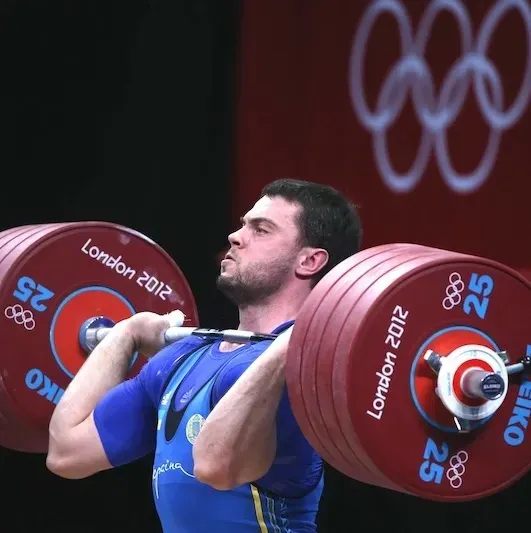
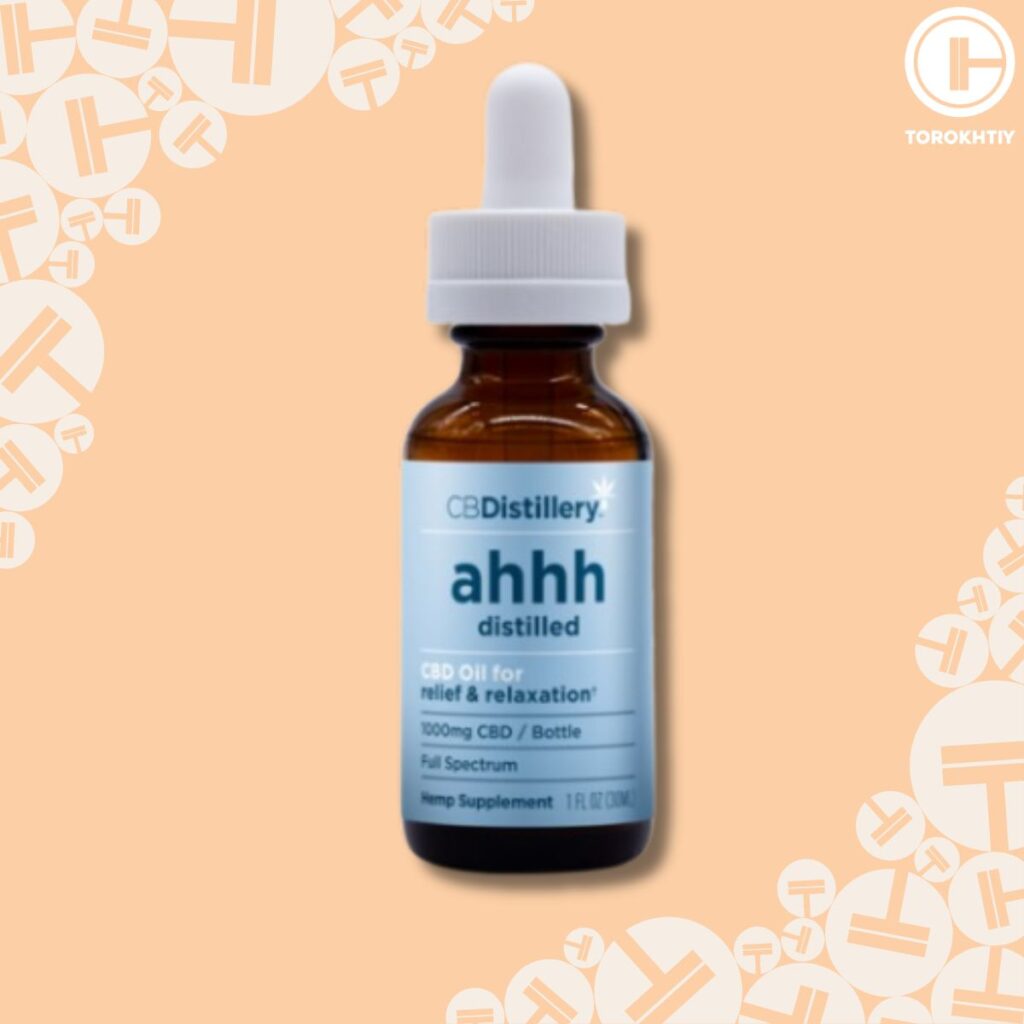
Still have questions after reading our article? Unlock your full potential by engaging with our experts and community! Don’t hesitate — leave a comment below and Jacek Szymanowski will provide a personalized answer and insights to help you reach your goals.